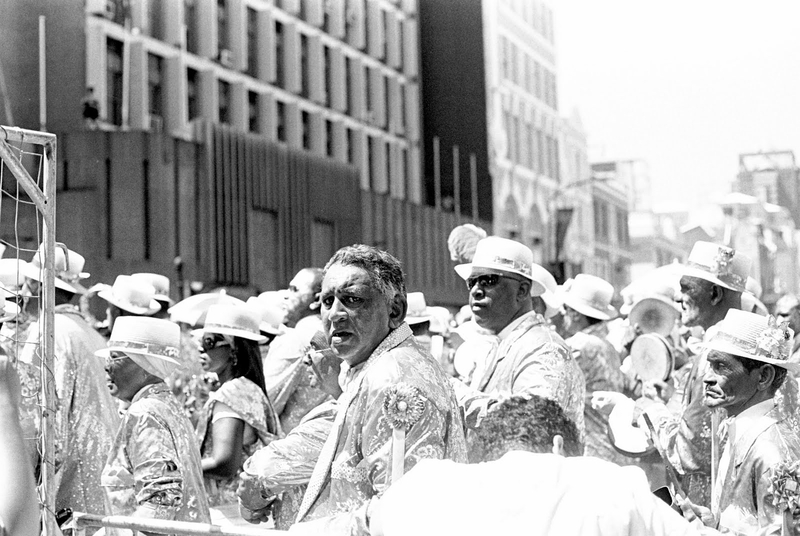The annual 'Klopse' or minstrel carnival which is performed on the streets of Cape Town on the 1st day of the new year, started as a freedom parade to celebrate the abolishment of slavery.
It's a new year #1

- 15 Comments
-
-
seilatsatsi
welcome shy 1!!
-
-
Sam Buk
welcome :)
-
-
MothMan
welcome! cool pic
-
-
Uno
Welcome! Definitely not shy about this one, it takes some bravery to photograph the carnival in B&W and you did it very well...
I might be wrong but didn't the carnival start before the abolishment of slavery? Wasn't it that one day of the year where the slaves were given some "freedom" to express themselves? (leaving important stuff at work to google it, looking out for the boss over the shoulder...)
-
-
Greer
thank you. happy to b
here.
@ UP: so...i heard/read it started as a freedom parade. Could be wrong. Let me know what you find out (while your boss isn't looking of course:))
I had to squeeze past/through the crowds to take this pic, some people had been camping out in wale street all day.
& All I had was a roll of B&W film...
happy with the results though, i was pleasantly surprised.
-
-
Juxtapose
welcome welcome, great welcome
-
-
lebogang nkoane
Word — welcome!
-
-
Karabo_Ngoatle
Madume
-
-
Khumbelo
No tanganedzwa!
-
-
Palapala
A nice 1
-
-
NguJaz
I just don't get how Minstrelsy became "culture" -- considering its origins
-
-
Sukum'ukhanye
Welcome
-
-
Uno
@ shy 1: Yep, you're right, it started as a celebration of the end of slavery, influenced by the minstrels that came with the Alabama, which, by the way was a confederation ship, ironic if not just absurd...
'Christy's Minstrels premiered in Cape Town on August 20, 1862. Orpheus Myron McAdoo’s Virginia Jubilee Singers from Hampton, Virginia, the first black minstrels to tour South Africa, arrived in Cape Town to an overwhelming reception on June 19, 1890. According to Martin, the reception was overwhelming because, locals are recorded as having said in amazement, "they were black."
"Our songs come from our forefathers and their fathers before. They were oppressed when they came. They came here as slaves you know and they were always the oppressed and so the only way they could express themselves was putting it in words, singing, dancing, making music and being jolly. So that the next one would think we are happy. In the meantime we are expressing our feelings about certain things"
Other interesting facts:
Coons (blacks) - Probably refers to the Portuguese word for slave pens or barracks "baracoons". Could also have meaning as a shortening of "raccoon", as raccoons have a tendency to steal.
source: http://gyral.blackshell.com/names.html (the racial slur database)also go to:
http://www.ferris.edu/jimcrow/coon/The movie "Bamboozled" by Spike Lee is a must watch on the subject of cooning also.
There is just too much confusion with the exact objectives of these parades and how much do people know about it (both watchers and minstrels) influencing their take on it: between being cooned or cooning, with the risk of becoming just another tourist attraction and an excuse to dress up and party (if it's not already).
My opinion is that having its origins on a certain kind of social critique why not evolve with time and not be so stuck in tradition, why not make fun of our present politicians and rulers (there's enough there for 5 carnivals)?
-
-
Greer
@UP wow. I struggle with the parades myself. I don't really understand the objective in our present context - (it hasn't really evolved, and is so far removed from its roots) so ditto to what you're saying above. hmmm I saw a documentary called the "Silver Fez" recently about the Malay Choirs, and it touches on the klopse tradition as well.
-
-
Chwama
SHINE!


